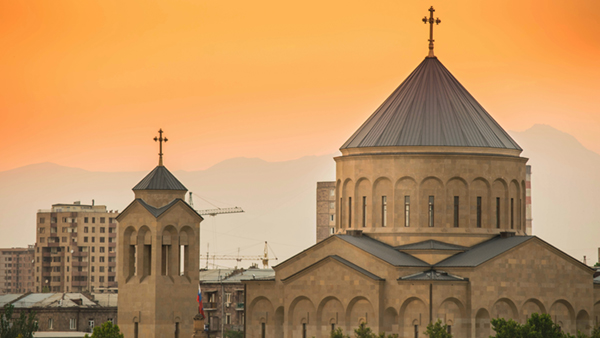What does a government ordained by God look like? For the apostle Paul writing to the Romans, it was the Roman Empire — not what you would call an enlightened regime. You and I wouldn’t like it even if we had been Roman citizens. Yet Paul referred to these pagan rulers as governing authorities established by God, and he instructed persecuted Christians to submit to them "for conscience sake":
"Everyone must submit to the governing authorities, for there is no authority except from God, and those that exist are instituted by God. So then, the one who resists the authority is opposing God’s command, and those who oppose it will bring judgment on themselves" (Rom. 13:1–2).
Americans are fortunate to have a much higher government standard: "government of the people, by the people and for the people," founded on the principle that all people are endowed by their Creator with certain unalienable rights.
Don’t ever let anybody tell you that the founding document of the United States is the Constitution. The U.S. Constitution is really the enabling document for the founding document of our nation, the Declaration of Independence.
Government, along with its appointed officials, is ordained by God to curtail evil in the world. That is its primary responsibility — to protect those who do right and punish those who do wrong. "For rulers are not a terror to good conduct, but to bad. Do you want to be unafraid of the authority? Do good and you will have its approval. For government is God’s servant to you for good. But if you do wrong, be afraid, because it does not carry the sword for no reason. For government is God’s servant, an avenger that brings wrath on the one who does wrong" (Rom. 13:3–4).
Our Christian obligation is to support the government through tribute and through taxation. It is our godly duty to obey the law even when no one’s looking: "Therefore, you must submit, not only because of wrath, but also because of your conscience" (Rom. 13:5). It is our godly duty to obey the laws even if we disagree with them — unless in doing so we would disobey God — and seek to change them in a peaceful manner. We are to render unto Caesar the things that are Caesar’s and unto God the things that are God’s.
The apostle Paul’s command in Romans 13:6–7 is clear: "And for this reason you pay taxes, since the [authorities] are God’s public servants, continually attending to these tasks. Pay your obligations to everyone: taxes to those you owe taxes, tolls to those you owe tolls, respect to those you owe respect and honor to those you owe honor."
We need to obey the law and pay our taxes. If we don’t, we can expect that sooner or later the hammer of the government will come down, and we will have brought reproach upon the gospel.
We have a ministry to the world as "salt" and "light" (Matt. 5:13–16), and we all have responsibilities to the civil authorities. A biblical lifestyle requires us to maintain the proper balance among the three divinely ordained institutions of family, church and government and to ensure that no one sphere leans so far over onto another that the proper equilibrium is disrupted.
Whether or not America has a future worth having doesn’t depend on what happens in Washington or on what happens in the Supreme Court or in Congress. It depends on what happens with you and people just like you, your family and families just like yours and your church and churches just like yours, with godly pastors after God’s heart and church members thirsting for God’s Word. Our future is in His hands (Ps. 121:1–2).
Independence Day is a wonderful day to reflect on the precious freedoms we enjoy in this great country. It is a day to give thanks to our Almighty God whose hand has surely been upon this nation. And it is a day to commit anew our resolve to pray for spiritual revival to sweep across our nation.
Editor’s Note — Richard Land is president of The Ethics & Religious Liberty Commission.
(BP)





Share with others: